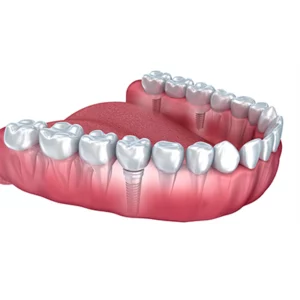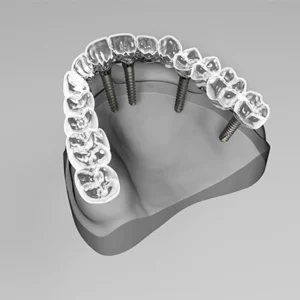
Patient Info
Dental Implants
Cosmetic Dentistry
General Dentistry
If you are among the millions of American adults who are missing one or more teeth, you may be wondering what your options for replacement are. Dr. Byron Scott at Springhill Dental Health Center in Mobile offers several options. One of the most popular ones is dental implants because they are so similar to natural teeth.
Dental implants are surgically inserted into the jawbone, creating a stable base for your prosthetic tooth. This tooth replacement option has been successfully used for more than 3 decades and every year, more than 5 million implants are placed.
Since implants are inserted into the jawbone, they look, feel, and function more like your natural teeth than removable options. However, in order to improve your chances of a successful procedure, it’s important that you:
In this article, we’ll explain what you need to know about dental implants.

A dental implant has three pieces an implant screw, an abutment, and a prosthetic tooth/crown.
Prior to the procedure, Dr. Scott will perform a full examination. This will include reviewing your oral and overall health history, lifestyle habits, and more to determine if you are a good candidate for dental implants. If you are, you can move forward with treatment.
Typically, implants are placed under local anesthesia- but sedation is available for patients who need it. There are different levels of sedation based on your needs. The process typically takes several months to a year to complete. Here’s what you can expect:
If you have remaining natural teeth that must be extracted or active gum disease, this will need to be taken care of prior to implant placement. If you have some jawbone deterioration, a bone graft may be necessary.
Dr. Scott will administer the appropriate anesthesia to help you relax. An incision will be made in the gum and a hole drilled in the jawbone. The implant screw will be placed, and the incision will be closed. In the case of same-day implants or All-on-4, the prosthesis will be placed before you leave the office. If you are getting traditional implants, you will be sent home to heal- which can take up to 6 months.
Once the jawbone has secured the implant screw in place, the incision will be opened, and the abutment will be placed. A healing cap will be placed on this to prevent the gum from healing over it. Impressions will be taken at this time to order your prosthesis or crown.
Finally, your permanent crown will be attached, and your procedure will be complete.

The surgery to place the implants usually takes several hours- especially if multiple implants are required. Therefore, this may not be the ideal option for patients who are at an increased risk of infection.
Dental implants offer several advantages over conventional dentures, including a natural ability to speak and eat. Additionally, there are no special considerations for care and maintenance, you can care for implants like natural teeth.
Research has proven that dental implants are a safe, effective tooth replacement option for most patients. However, this is not the ideal option for everyone. There are a few reasons that may disqualify you from treatment:
If you are missing one or more teeth, Dr. Scott will work with you to determine the best course of treatment.
My visit was incredible. I had my “All on Four” appliances cleaned, and it was a painless and thorough experience. Dr. Scott and all his staff are very friendly. During the cleaning, Mary was gentle and let me know everything she was doing and how it would feel. She gave me tips on how to clean my implants/appliances better and gave me a small brush to do the underside more effectively. Dr. Scott and Mary suggest cleanings take place every 3 months so I will be back in December.

Dr. Byron Scott is a highly-trained and accomplished dentist. He attended The University of Alabama School of Dentistry and subsequently completed numerous Advanced Studies and Trainings. Dr. Scott is Board-Certified by The Academy of General Dentistry and has earned Mastership status (MAGD), an honor shared by only 1% of dentists. He has numerous memberships and associations, including Diplomate status with The American Board of Oral Implantology (D-ABOI) and The International Congress of Oral Implantologists (D-ICOI). Overall, Dr. Scott has dedicated his life and career to helping patients improve their oral health through expert dentistry. His goal is to help each patient keep their smile healthy, attractive, and comfortable for the duration of their lifetime.
